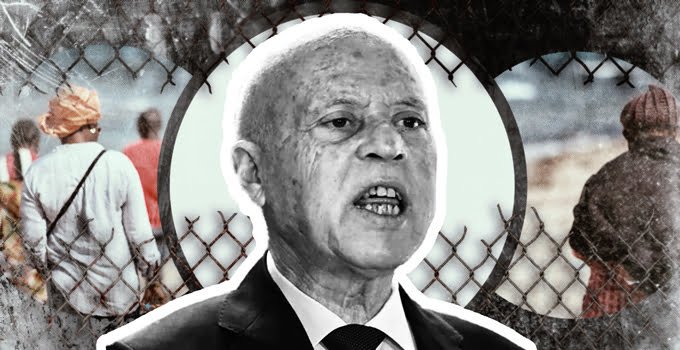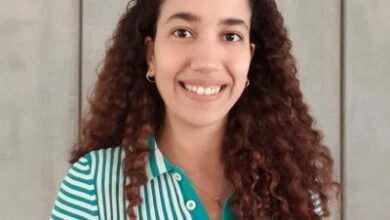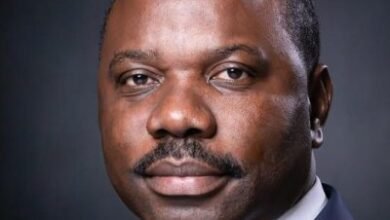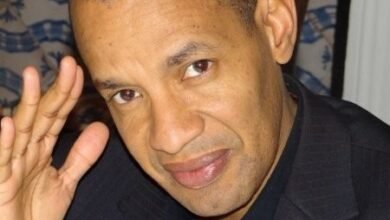Sub-Saharans in Tunisia: Saied’s untruths

The President accuses civil society of encouraging the settlement of undocumented sub-Saharan migrants in the country. Kais Saied denounces those who want to « change the demographic make-up » of the country, citing « violence and crime ». His proof? The Ministry of Interior, contacted by Nawaat, says it has no statistics on the number of migrants involved in criminal cases. And the facts sweep away the xenophobic fantasies.
By Rihab Boukhayatia
President Kais Saied lashed out at the « hordes of illegal migrants from sub-Saharan Africa ». Urgent » measures are needed to stop this « ceaseless flow » that causes « violence and crime”, Saied told a meeting of the National Security Council on February 21. These unprecedentedly virulent comments were taken up in a statement posted on the official Facebook page of the Tunisian presidency, sparking a heated debate on social media. The next day, the Head of State persisted and signed during a visit to the premises of the Tunisian Company of Pharmaceutical Industries on February 22, attacking those who want to « change the demographic composition of Tunisia. »
These comments come amid rising hate speech against migrants in Tunisia. The Tunisian nationalist party, which is very active on social media and openly xenophobic, has called for the expulsion of undocumented migrants from sub-Saharan Africa.
This party now has the right to be heard, as its members are received and listened to by representatives of the state. On December 29, 2022, the governor of Ariana received members of this movement. A month later, on February 9, 2023, members of the party even posted on Facebook a picture of them with an official from the Prime Ministry. But for such controversial statements to be taken up at the very top of the state is unprecedented.
Conspiracy rhetoric
The President of the Republic embraced the rhetoric of the Tunisian nationalist party. He pointed the finger at ‘a criminal arrangement launched at the beginning of this century with the aim of changing the demographic composition of Tunisia’. And he denounced ‘third parties that have received huge funding since 2011 to populate the country with illegal migrants from sub-Saharan Africa’. The President of the Republic continues his conspiracy theory by arguing that there is an « unspoken » objective behind this arrangement. Namely, to strip Tunisia of its Arab-Muslim identity and reduce it to its African dimension.
This anti-migrant rant refers to the “Great Replacement” theory introduced in 2010 by French writer Renaud Camus. Having become the focus of political debates in France, this theory has been exported to other countries, this time reaching Tunisia. A country with a large diaspora abroad.
In France, the leader of the “Reconquête” party, Eric Zemmour, welcomed Saied’s speech and used it to defend his call to expel undocumented migrants from his country. Even French far right figures are no longer making such virulent speeches in a concern for respectability.
Tunisia has a population of just over 11 million. But only about 57,000 sub-Saharan migrants live there, according to estimates by the United Nations Department of Economic and Social Affairs (UNDESA). The National Survey on International Migration, published in 2021 and carried out by the National Institute of Statistics (INS) and the National Migration Observatory, puts the figure at almost 59,000. However, these two organizations are not part of the civil society that Kais Saied denounces, but of the state.
The arrival of migrants in Tunisia is not the result of a settlement arrangement, but of a national policy and a regional context. The abolition of visas to enter Tunisia for nationals of many sub-Saharan countries has contributed to this migration. This visa exemption, granted for years by the Ministry of Foreign Affairs, was intended to boost business exchanges with these countries.
As a result, many migrants have entered Tunisia legally. Among them are students who have come to study in Tunisia within the framework of bilateral cooperation between Tunisia and their country of origin. Moreover, the illegal status of some of them in Tunisia is due to the administrative paperwork that hampers the renewal of their residence permits.
More generally, the intention of many migrants is not to settle in or colonize Tunisia, but to make it a transit country to Europe. According to the survey conducted by the INS and the National Migration Observatory, almost two-thirds of sub-Saharan migrants intend to leave Tunisia.
Arab-Muslim identity under threat?
According to the same survey, migrants in Tunisia come mainly from the Maghreb (37%), other African countries (36.4%) and Europe (18.5%). Of the 6,068 refugees and asylum seekers, 45.4% are Syrians, according to data from the United Nations High Commissioner for Refugees (UNHCR) in Tunis in September 2022. Migrants, refugees and asylum seekers come from a variety of countries, many of which are Muslim or have a large Muslim population, such as Libya, Mali or Eritrea.
Saied’s comments seem to echo those of the Tunisian nationalist party, which refers to the expansion of sub-Saharan churches. First of all, the Tunisian constitution guarantees freedom of belief and worship. The move by Christian migrants to establish their places of worship is part of a logic of resourcefulness in response to the absence of the state, Ali Belhaj, a teacher, researcher and expert on international migration, tells Nawaat. « They had to find their own solutions. We find places of worship, restaurants, venues for parties intended for them,” he adds.
For the expert, the Tunisian state is absent when it comes to managing migratory flows. Kais Saied is pitying a situation for which he himself is responsible.
A complicit civil society?
The arrival of migrants by illegal means is subject to human trafficking and smuggling. These traffickers always act illegally, plundering migrants in the process. According to the 2022 report of the National Authority for the Fight against Trafficking in Persons (INLTP), 54% of victims of trafficking in 2021 were foreigners. Of these 64% were Ivorians.
It is not civil society that encourages the arrival of migrants but rather the trafficking networks.
Far from facilitating the settlement of migrants in Tunisia, the UNHCR has been accused by refugees and asylum seekers of abandoning them. Homeless and lacking financial resources, they say they want to leave Tunisia for other countries. In July 2022, protesters staged a sit-in at the organization’s headquarters in Tunis.
Some components of civil society, such as the Tunisian Forum for Economic and Social Rights (FTDES), Terre d’asile, Médecins du Monde, etc., are working to improve the chaotic situation of migrants in Tunisia. These organizations have had to fight for access to health and education for migrants. These rights are guaranteed on paper, as the constitution grants them regardless of the beneficiary’s nationality or status.
The role of civil society is also to draw attention to the economic exploitation of migrants. Contrary to the claims of the Tunisian nationalist party, migrant workers do not steal jobs from Tunisians. Migrants work in sectors such as catering, agriculture and construction that are shunned by the Tunisian workforce.
Kais Saied accuses migrants of violence and criminality without providing any figures or facts to back up his statements. When contacted by Nawaat, Faker Bouzghaya, press and communication officer at the Ministry of Interior, said that his ministry does not have statistics on the number of migrants involved in criminal cases. « Our statistics are not based on ethnic or racial criteria, » he explains.
In sum, Saied’s comments seem to tap into the prejudice and racism currently flourishing on social media. The head of state adopts racist and xenophobic language, leaving migrants at the mercy of mob justice and police crackdown.
*Rihab Boukhayatia
Specializing in rights and freedoms, I have been a journalist at Nawaat since 2019, where I also cover social issues. A lawyer by training, I also do research in political science alongside my work.
Source : Nawaat.org






